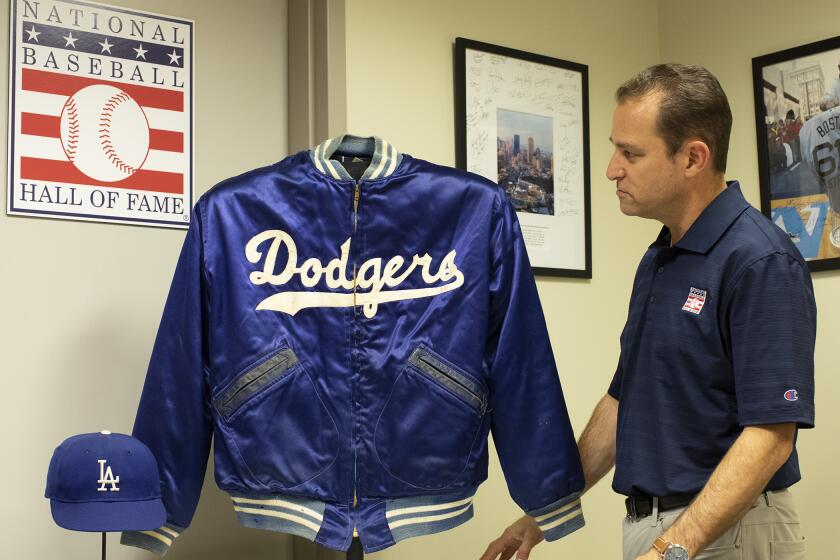Drug-Test Clauses Fall in Baseball
- Share via
NEW YORK — A federal arbitrator ruled Wednesday that drug-testing clauses contained in the contracts of several hundred major league baseball players are unenforceable.
“He ruled that the clubs may not get results from any drug tests by bypassing the union,” Donald Fehr, executive director of the Major League Players Assn., said in commenting on the ruling by arbitrator Tom Roberts. “They must go through the union.”
Fehr said the ruling meant that the drug-testing clauses are illegal.
“Obviously, we’re pleased,” said Fehr, whose union filed a grievance against the drug testing earlier this year. “It was the correct decision. It reaffirmed the basic principle that you can’t bypass the union. Now we go back and negotiate.”
Angel pitcher Mike Witt, the team’s player representative, said: “Basically, it’s just something we thought we were right about. Basically, we wanted to have a joint drug agreement. Now we can figure out something mutually agreeable.
“I would say the next step is for both sides to get together and work out an agreement. Hopefully, I would think it would be something we could get figured out before the start of next season.
“We weren’t surprised by the decision.”
Several Dodgers, too, expressed satisfaction at the decision.
“It’s the beginning of the end of this confrontation,” catcher Mike Scioscia said. “Hopefully, now a new plan can be worked out between the management and union, and that will take care of the problem.
“I think the important thing is (that) they understand the players’ thinking on the issue. This doesn’t mean we’re against trying to find a solution to the problem; we just feel it has to go through the union.”
The Dodgers’ Bill Russell, who like Scioscia had a drug-testing clause in his contract, said: “It doesn’t make any difference to me. They can do what they want. If they want us to take a test every day, I’ll do it, if that’s what it takes to stop it.
“I don’t think the union is against it (drug-testing). They just want a right way of doing it.”
Dodger pitcher Rick Honeycutt, an active unionist, said: “Any stand we take, there’s a reason for doing it. Everybody looks at the association from a negative aspect regarding drugs, but we understand the problem. Drug testing at some level may work . . . all we want to do is protect our rights. You just can’t throw out a plan and say, ‘Here,’ without collective bargaining.”
Management’s response was somewhat less enthusiastic.
Barry Rona, executive director of the Players Relations Committee, said: “I’m very disappointed by the decision. It’s clear that the real losers are the players.”
Bill Giles, owner and president of the Philadelphia Phillies, said: “It’s very disappointing. I feel really bad for the players, the game and the country that the arbitrator would rule this way. There is nothing we can do about it, we just have to live by the decision.”
Murray Cook, general manager of the Montreal Expos, was less pessimistic than Giles. “It’s just part of the arbitration process,” Cook said. “Naturally, we are disappointed, but we do know that the players’ association wants to hammer out a special agreement with management, so we’re hopeful.”
Roberts’ answering service said he was en route to his office in Los Angeles and wasn’t available for comment.
Fehr said the decision “does not change our conviction that a long-term agreement on a joint drug program is in the best interest of everyone in baseball, clubs and players alike. We are persuaded that the association and the clubs should establish a jointly administered program focusing on education, early diagnosis and treatment by expert medical personnel in confidentiality.”
The drug-testing clauses began appearing in renegotiated, long-term and guaranteed contracts following a decision last October by the 26 major league owners to end the 1 1/2-year-old anti-drug enforcement agreement that had been part of management’s basic agreement with players.
Steve Yeager, then a catcher with the Dodgers and now with Seattle, signed a Dodger contract in November that included a drug- and alcohol-testing clause. Other clubs quickly followed suit in requiring such clauses.
Joel Youngblood of the San Francisco Giants balked at signing a contract that included the testing clause. Although he later agreed to it, the Giants withdrew their contract offer.
In accepting presentations on the grievance, Roberts ordered the Giants to permit Youngblood to sign and said the outcome of the grievance would determine whether the clauses are enforceable.
This grievance was unrelated to testing ordered by Commissioner Peter Ueberroth for players whose previous association with drugs surfaced during a trial in Pittsburgh last year.
In football, the players are arbitrating the question of whether a drug-testing program must be negotiated with the union. The NFL Players Assn. challenged NFL Commissioner Pete Rozelle’s plan to add two unscheduled tests during the season to preseason drug tests already authorized by 1982 collective bargaining agreement with the union.
Rozelle testified before the arbitrator Wednesday, and a decision is expected by mid-September.
More to Read
Are you a true-blue fan?
Get our Dodgers Dugout newsletter for insights, news and much more.
You may occasionally receive promotional content from the Los Angeles Times.










